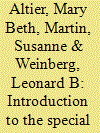|
|
|
Sort Order |
|
|
|
Items / Page
|
|
|
|
|
|
|
| Srl | Item |
| 1 |
ID:
190897


|
|
|
|
|
| Summary/Abstract |
The potential threat posed by returning and repatriated foreign fighters and the upcoming release of homegrown violent extremists from prisons in developed democracies has raised interest in terrorist rehabilitation programs. Few studies, however, systematically examine how the public views such programs. Drawing on research on public attitudes toward prisoner reentry in criminology and social psychological theory, this study offers a series of hypotheses about support for rehabilitation programming for terrorist offenders. These hypotheses are then tested through a survey experiment on a nationally representative sample of 1,021 adult citizens in the United States. The results show that the public is less supportive of postrelease rehabilitation programming for terrorists than other criminal offenders. Support is also lower when an Islamist, rather than a white nationalist, offender is referenced. Support increases when a referenced Islamist is described as a juvenile convicted of a less serious offense. Men, younger individuals, those with some college education, and self-identified liberals are more likely to support terrorist rehabilitation programming. Finally, irrespective of treatment, respondents are most likely to cite evidence of effectiveness as the factor that would increase their support for rehabilitation programming.
|
|
|
|
|
|
|
|
|
|
|
|
|
|
|
|
| 2 |
ID:
120316


|
|
|
|
|
| Publication |
2013.
|
| Summary/Abstract |
At a White House banquet held in his honor in March 1954, Winston Churchill observed that it was better to "jaw-jaw" than "war-war." In the Cold War atmosphere of the time (Stalin had died the previous year), Churchill was maintaining that talking with the Soviet leadership was better than a nuclear confrontation between the two superpowers. Who would argue otherwise?
|
|
|
|
|
|
|
|
|
|
|
|
|
|
|
|
| 3 |
ID:
178946


|
|
|
|
|
| Summary/Abstract |
We thank Marc Sageman for his interest in our article and are grateful to Terrorism and Political Violence for the opportunity to respond. Our study was part of a three-year grant-funded project entitled “Pathways, Processes, Factors, and Roles for Terrorist, Disengagement, Re-engagement, and Recidivism.” The aim was to better understand individual-level disengagement from terrorism, as well as re-engagement and recidivism. We conducted two extensive reviews of literature from relevant disciplines—one on terrorist disengagement and another on terrorist re-engagement and recidivism.1 We then collected and analyzed data from a sample of autobiographies penned by individuals formerly involved in terrorist groups and conducted in-depth, in-person interviews with another sample of individuals who had left terrorist groups. The questionnaire and codebook that we developed to capture information from our autobiographical sample compiled data on subjects’ lives prior to their involvement in terrorism, important aspects of their involvement in terrorism including the nature of the groups they belonged to, and the conditions surrounding their disengagement and re-engagement and/or recidivism. An entire section of our questionnaire and codebook are dedicated to investigating not only whether individuals re-engaged, but the circumstances of that re-engagement and what we identified as hypothesized risk factors. We reiterate this because Sageman implies throughout his critique that we were using data that we originally compiled to study something else (disengagement) to then “derive a recidivism rate.” We did not. Although our findings on disengagement were analyzed and published first,2 the purpose of the broader project was always to consider re-engagement and recidivism. This informed our review of relevant literature, generation of hypotheses, and the development of data collection protocols.
|
|
|
|
|
|
|
|
|
|
|
|
|
|
|
|
| 4 |
ID:
178944


|
|
|
|
|
| Summary/Abstract |
Recent interest in terrorist risk assessment and rehabilitation reveals the likelihood and risk factors for terrorist reengagement and recidivism are poorly understood. Informed by advances in criminology, this study develops a series of theoretical starting points and hypotheses. We test our hypotheses using data on 185 terrorist engagement events, drawn from eighty-seven autobiographical accounts, representing over seventy terrorist groups. We find terrorist reengagement and recidivism rates are relatively high in our sample and similar to criminal recidivism rates except in the case of collective, voluntary disengagements when an entire group chooses to disarm. We account for why we observe relatively high rates in this sample. With regard to risk factors, we find terrorists are less likely to reengage as they age. Radical beliefs and connections to associates involved in terrorism increase the likelihood of reengagement. Social achievements (marriage, children, employment) do not commonly serve as protective factors, at least in the short term, when controlling for beliefs and connections. Finally, those from an upper or middle-class childhood family are less likely to reengage.
|
|
|
|
|
|
|
|
|
|
|
|
|
|
|
|
| 5 |
ID:
188762


|
|
|
|
|
| Summary/Abstract |
Research pays little attention to the diverse roles individuals hold within terrorism. This limits our understanding of the varied experiences of the terrorist and their implications. This study examines how a terrorist’s role(s) influence the likelihood of and reasons for disengagement. Using data from autobiographies and in-person interviews with former terrorists, we find that role conflict and role strain increase the probability of disengagement. We show those in certain roles, especially leadership and violent roles, incur greater sunk costs and possess fewer alternatives making exit less likely. Finally, certain roles are associated with the experience of different push/pull factors for disengagement.
|
|
|
|
|
|
|
|
|
|
|
|
|
|
|
|
| 6 |
ID:
134156


|
|
|
|
|
| Publication |
2014.
|
| Summary/Abstract |
Although research on violent extremism traditionally focuses on why individuals become involved in terrorism, recent efforts have started to tackle the question of why individuals leave terrorist groups. Research on terrorist disengagement, however, remains conceptually and theoretically underdeveloped. In an effort to enhance our understanding of disengagement from terrorism and pave the way for future empirical work, this article provides a multidisciplinary review of related research from psychology, sociology, and criminology. Significant promise for moving beyond the existing push/pull framework is found in Rusbult and colleagues' investment model from psychology and Ebaugh's research on voluntary role exit from sociology. Rusbult's investment model offers insight into when and why individuals disengage from terrorism, while accounting for individual, group, and macro-level differences in the satisfaction one derives from involvement, the investments incurred, and the alternatives available. Ebaugh's research on voluntary role exit provides a deeper understanding of how people leave, including the emotions and cuing behavior likely to be involved. The article highlights the strengths and limitations of these frameworks in explaining exit and exit processes across a variety of social roles, including potentially the terrorist role, and lends additional insights into terrorist disengagement through a review of related research on desistance from crime, disaffiliation from new religious movements, and turnover in traditional work organizations.
|
|
|
|
|
|
|
|
|
|
|
|
|
|
|
|
| 7 |
ID:
153955


|
|
|
|
|
| Summary/Abstract |
A deeper understanding of terrorist disengagement offers important insights for policymakers and practitioners seeking to persuade individuals to leave these groups. Current research highlights the importance of certain “push” and “pull” factors in explaining disengagement. However, such studies tell us very little about the relative frequencies at which these hypothesized factors are associated with leaving in the terrorist population. Using data collected from eighty-seven autobiographical accounts, we find that push, rather than pull, factors are more commonly cited as playing a large role in individuals' disengagement decisions and that the experience of certain push factors increases the probability an individual will choose to leave. Importantly, disillusionment with the group's strategy or actions, disagreements with group leaders or members, dissatisfaction with one's day-to-day tasks, and burnout are more often reported as driving disengagement decisions than de-radicalization. Finally, our results suggest that ideological commitment may moderate one's susceptibility to pull factors.
|
|
|
|
|
|
|
|
|
|
|
|
|
|
|
|
|
|
|
|
|